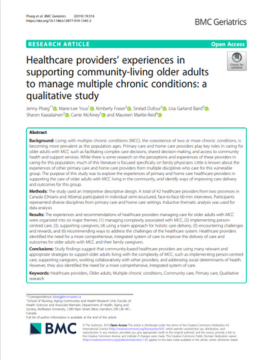Healthcare providers' experiences in supporting community-living older adults to manage multiple chronic conditions: a qualitative study
Typically, older adults with MCC receive care from multiple healthcare providers across various care settings. For older adults with MCC living in the community, these healthcare providers are mainly from primary care and home care settings and include a broad range of providers such as nurses, physicians, social workers, pharmacists, physiotherapists, and personal support workers (or healthcare aides). Older adults with MCC and their family and friend caregivers (hereafter referred to as caregivers) experience their care to be focused on single conditions and lacking a holistic focus on the client and family.
Author: Jenny Ploeg, Marie-Lee Yous, Kimberly Fraser, Sinéad Dufour, Lisa Garland Baird, Sharon Kaasalainen, Carrie McAiney & Maureen Markle-Reid
Publication Date: November 19, 2019
Description:
Background
Living with multiple chronic conditions (MCC), the coexistence of two or more chronic conditions, is becoming more prevalent as the population ages. Primary care and home care providers play key roles in caring for older adults with MCC such as facilitating complex care decisions, shared decision-making, and access to community health and support services. While there is some research on the perceptions and experiences of these providers in caring for this population, much of this literature is focused specifically on family physicians. Little is known about the experiences of other primary care and home care providers from multiple disciplines who care for this vulnerable group. The purpose of this study was to explore the experiences of primary and home care healthcare providers in supporting the care of older adults with MCC living in the community, and identify ways of improving care delivery and outcomes for this group.
Methods
The study used an interpretive descriptive design. A total of 42 healthcare providers from two provinces in Canada (Ontario and Alberta) participated in individual semi-structured, face-to-face 60-min interviews. Participants represented diverse disciplines from primary care and home care settings. Inductive thematic analysis was used for data analysis.
Results
The experiences and recommendations of healthcare providers managing care for older adults with MCC were organized into six major themes: (1) managing complexity associated with MCC, (2) implementing person-centred care, (3), supporting caregivers, (4) using a team approach for holistic care delivery, (5) encountering challenges and rewards, and (6) recommending ways to address the challenges of the healthcare system. Healthcare providers identified the need for a more comprehensive, integrated system of care to improve the delivery of care and outcomes for older adults with MCC and their family caregivers.
Conclusions
Study findings suggest that community-based healthcare providers are using many relevant and appropriate strategies to support older adults living with the complexity of MCC, such as implementing person-centred care, supporting caregivers, working collaboratively with other providers, and addressing social determinants of health. However, they also identified the need for a more comprehensive, integrated system of care.
Access: Free
Keywords: healthcare providers, older adults, multiple chronic conditions, community care, primary care, qualitative research



